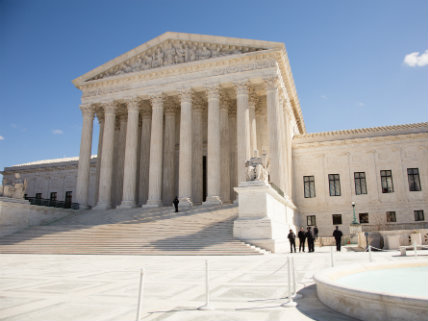Why Occupational Licensing is a Due Process Issue
GMU law scholar David Bernstein on how liberal and conservative judges can find common ground by embracing the right to pursue work.

The pursuit of happiness, it seems, does not extend to the pursuit of work.
At least that's been the longstanding view of the U.S. judicial system. Judges have been hesitant to identify a due process right to pursuing a lawful occupation, but the recognition of such a right could go a long way towards curbing occupational licensing and other government-created restrictions on who can do what work.
David Bernstein, a professor at the Antonin Scalia Law School at George Mason University, believes economic freedom can win favor with conservative and (perhaps surprisingly) even more so with liberal judges.
As Bernstein writes in a paper recently published by the Yale Law Journal Forum, there have been just two Supreme Court cases since the New Deal that expressly dealt with this question of whether an individual's right to pursue an occupation is covered by the Due Process Clause of the Fourteenth Amendment. Neither of those two decisions—Williamson v. Lee Optical (1955) and Ferguson v. Skrupa (1963)—should be seen as definitively closing down the possibility of judicial review of occupational licensing laws, or other legislative efforts to restrict employment, Bernstein argues.
In the decades since those rulings, though, the Supreme Court has embraced arguments about substantive due process to uphold so-called "unenumerated rights"—that is, rights not explicitly written into the U.S. Constitution or the Bill of Rights—like the right to an abortion and the right to same-sex marriage.
But the court hasn't thrown the doors wide open. In a 1997 case (Washington V. Glucksburg) where the Supreme Court unanimously rejected a due process argument for the right to commit suicide, Chief Justice William Rehnquist, writing for the majority, outlined when and how the Supreme Court could recognize such unenumerated rights. In order to be recognized as fundamental, Rehnquist wrote, those rights must be "deeply rooted in the Nation's history and tradition."
"The right to pursue an occupation free from arbitrary government action is certainly deeply rooted in American history," argues Bernstein.
In some ways, this is a throwback to an older interpretation of due process rights. The Supreme Court did recognize the right to earn a living in pre-New Deal cases. Meyer v. Nebraska, for example, refers to "the right…to engage in any of the common occupations of life." It's not that the right no longer exists, but that it's now subject to something called rational basis deference, which means it mostly loses in court because judges give legal deference to almost any justification offered by government for restricting occupational freedom.
The U.S. Supreme Court won't get a chance to address that issue this year, but some state courts are warming up to the idea that the Fourteenth Amendment's due process protections can extend to the right to pursue an occupation.
The Texas Supreme Court has gone the farthest so far, with a 2015 ruling in Patel V. Texas Department of Licensing and Regulation that invalidated a state law requiring practitioners of eyebrow threading to obtain a cosmetology license—an expensive and time-consuming process that includes limited, if any, instruction in the actual skills of eyebrow threading. The ruling is significant because the court set a new, higher standard for the government to meet before imposing rules that limit individuals' economic freedom.
Bernstein spoke with Reason about how courts might recognize a right to pursue work. The conversation has been lightly edited for length and clarity:

Reason: I think most people would be somewhat surprised to learn that there's no clear-cut constitutional right—not even one that's implied or interpreted by the courts—to having an occupation, even though that seems fairly central to the whole "life, liberty, and the pursuit of happiness" thing. What have the courts said about the right to pursue an occupation as a due process issue?
Bernstein: Since the late 1930s, the Supreme Court has held that economic regulations of any sort, including occupational restrictions, pass constitutional muster so long as the court could think of a rational basis, defined expansively, for the regulation. So there is a right to pursue an occupation, it's just that it will almost never be enforced under the federal constitution because the test the court applies is so deferential to the legislature.
Reason: Occupational licensing laws are something we usually think about as an issue for legislatures. But you argue that courts could play a role here. What would that look like?
Bernstein: At the very least, courts should invalidate occupational restrictions that are justified only by the desire to restrict competition. So far, five federal appellate courts have ruled on that issue, and two of them have held that even gross protectionism to benefit incumbent members of a profession is a valid "rational basis" for an occupational restriction, while three have held it is not.
I would prefer if courts would go a bit further, and require the government to show that it truly had a rational, public-spirited basis for the law it enacted, rather than just requiring that someone at some point in the litigation be able to make up a basis post-hoc.
Reason: You write a lot in this paper about how both liberal and conservative justices have been unwilling to take on the right to an occupation as a due process issue because of fears of "resurrecting Lochner." What should the average person know about the Lochner case, and why are Supreme Court justices on both "sides" scared of it?
Bernstein: Lochner v. New York was a 1905 Supreme Court case that held that New York State could not limit bakers to sixty hours of labor per week because that violated both the bakery workers' and the bakery owners' implicit right to liberty of contract under the Fourteenth Amendment's Due Process Clause. The case is less important for its specific holding than for its symbolic importance, that it represents everything that was wrong with the Supreme Court's jurisprudence before the New Deal.
For liberals, it became a symbol for the notion that courts should allow Congress and state legislatures to engage in economic regulation and experimentation, even if it interferes with what traditionally were considered important economic rights. For conservatives, Lochner demonstrates that courts should be extremely hesitant to enforce any unenumerated rights under the Due Process Clause. Both of these perspectives rely on the notion that Lochner was a uniquely poorly-reasoned case with a uniquely bad practical outcome. In my writings, I've tried to demonstrate that Lochner's flaws have been greatly exaggerated.
Reason: You write that judicial support for the right to pursue an occupation has come historically from the right, but it might find more fertile ground with liberal/progressive justices in the near future. Why is that?
Bernstein: Historically, before the New Deal, the right to pursue an occupation was protected under the Fourteenth Amendment's Due Process Clause. Conservative judges have largely disavowed protecting any rights not specifically mentioned in the Constitution under that clause, for fear of legitimizing a series of liberal "activist" opinions under that clause.
Most notably, conservative don't want to lend any credence to Roe v. Wade, which found a very robust right to abortion under the Due Process Clause, sufficient to overcome the laws of all fifty states and give the U.S. what at the time was the most liberal abortion regime in the world.
Liberals, meanwhile, typically think courts should stay out of controversies over economic regulation. But the right to pursue an occupation could easily be recharacterized as a non-economic right. As one legal scholar has noted, "the choice of occupations reflects and affects "personal capacities, values, style of life, social status, and general life prospects in innumerable ways," and is a vital form of self-expression." The right to pursue an occupation can therefore be reconceptualized by progressives as a personal autonomy right rather than as an economic right.
Reason: We now have a new nominee to fill the vacancy on the Supreme Court. What should we know about Judge Gorsuch's views on this subject? Since he figures to leave the court about where it was, ideologically, when Scalia was on the bench, is that a good thing or a bad thing for the approach you're advocating here?
Bernstein: To my knowledge, Judge Gorsuch has not opined on this issue, beyond general standard conservative rhetoric about how public interest groups should look to achieve their goals in the legislature, not the courts.
Younger conservative jurists tend to be less hostile than the older generation to judicial engagement on economic issues, so Gorsuch's youth--he was born about thirty years after Scalia--is at least a mildly good sign.


Show Comments (12)